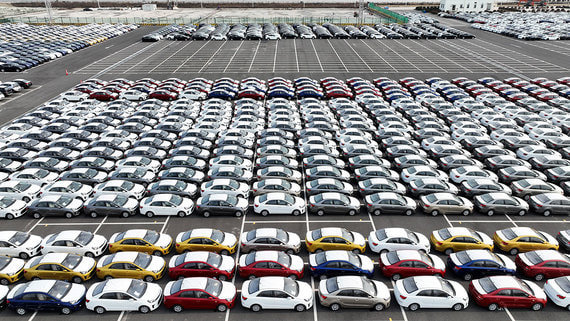The European Commission will conduct an investigation into subsidies for electric vehicles in China
[ad_1]

The European Commission (EC) is launching an investigation into Chinese subsidies for the production of electric vehicles, as the global market is “flooded” with cheap Chinese cars of this type. This was announced on Wednesday, September 13, by EC President Ursula von der Leyen, speaking at the European Parliament meeting in Strasbourg with her annual speech “On the State of the Union”. “Their [китайских электромобилей] the price is kept artificially low by huge government subsidies. This distorts our market. Today I can announce that the commission is launching an investigation into subsidies for electric vehicles coming from China,” von der Leyen said (quoted from the EC’s YouTube channel).
The EC will have up to 13 months to assess whether, at a minimum, tariffs should be introduced above the EU standard rate of 10% on cars. The subsidy investigation covers both Chinese-made electric vehicles and non-Chinese brands produced there, such as Tesla, Renault and BMW. The investigation is unusual in that it was launched by the commission itself, and not in response to a complaint from industry representatives.
The Chinese auto industry is offering significantly more affordable electric vehicles. Thus, a model from the leading Chinese company BYD called Dolphin costs, according to the aggregator EV-Database.org, about 30,000 euros, and a model Citroen e-C4 comparable in characteristics to it costs 36,000 euros.
Based on the results of the first half of 2023, China for the first time became the world leader in car exports, the Chinese Association of Automobile Manufacturers (CAAM) reported on August 6: 2.14 million cars were delivered outside China in January–June. This is 70% more than for the same period in 2022 (1.33 million). In the first half of 2023, China for the first time took the leadership in automobile exports from Japan, which shipped 2.02 million cars abroad (+17% compared to the same period in 2022). At the same time, the share of electric vehicles in Chinese auto exports doubled over the same period – to 25%. In the seven months of 2023, China has already supplied 2.8 million vehicles abroad, which is 74% more than in the same period last year (of which 1.8 million are vehicles with internal combustion engines). 400,000 of this number are electric vehicles delivered to the EU.
In addition to quantitative indicators, China has been increasing its expansion in specific areas. Russia, as Vedomosti wrote on July 12, became the main destination for Chinese automakers in January–May: 287,000 vehicles were delivered during this period, partially taking over the niches of European and South Korean manufacturers after their departure in 2022. According to an August forecast by the analytical company ABI Research , by the end of 2023, the EU will import about 1.2 million units of Chinese electric vehicles alone. At the same time, government subsidies in China to support manufacturers of electric and hybrid cars in 2016–2022. are estimated by ABI Research at $57 billion.
The founder of the Chinese electric vehicle manufacturer Nio, William Li, said back in April at the Shanghai Auto Show that the cost of producing such cars in China is 20% lower than that of Tesla in the United States. Lee warned that such an advantage could result in a backlash from European governments. “After [наш] exports will grow, market protectionism will certainly arise. This is not good for global sustainability, but we must respect each country’s considerations to protect local industries. This is the reality we must face,” Lee said (quoted by Reuters).
Increasing the production of cars and electric vehicles for export with government assistance is a targeted strategy of the Chinese state and business to capture and consolidate as large shares as possible in foreign markets, from which it would be more difficult to knock them down later, says Sergei Lukonin, head of the sector of economics and politics of China at IMEMO RAS. He is confident that the EC, in its investigation, will come to conclusions about Beijing’s unfair competition through understating the cost of its products with subsidies and will begin developing countermeasures to protect European manufacturers.
Protective import duties seem to be the most obvious response from Brussels: due to the costs of paying them, the price of cars produced in China will increase, which will reduce their competitive advantages, says Ilya Zharsky, managing partner of the Veta expert group. More radical measures to support the European automobile industry, if the spiral of confrontation on this issue continues to develop, may include the introduction of import quotas and increased tax rates for owners of cars of specific brands, continues Zharsky. On the other hand, China may file a claim with the WTO, pointing out signs of violations of the organization’s norms, the lawyer notes. And although the WTO dispute resolution mechanisms are extremely cumbersome and ineffective, for the EU to be involved in such a dispute will be reputationally painful. “In addition to a lawsuit in the WTO, Beijing can respond in case of restrictions from the EU by introducing mirror measures,” Zharsky admits.
This development of events is quite expected, given the expansion plans of Chinese automakers and the ever-increasing quality of their products, says independent automotive industry consultant Sergei Burgazliev. He recalls that both the EU countries and China are members of the WTO, so this dispute can be considered exclusively within the organization. According to WTO rules, there are four types of measures to protect the market, the expert says. According to him, the European Union can introduce anti-dumping duties, come up with something like an environmental tax – recycling fee, or introduce a legislative restriction on the standard of imported batteries for electric cars.
[ad_2]
Source link








